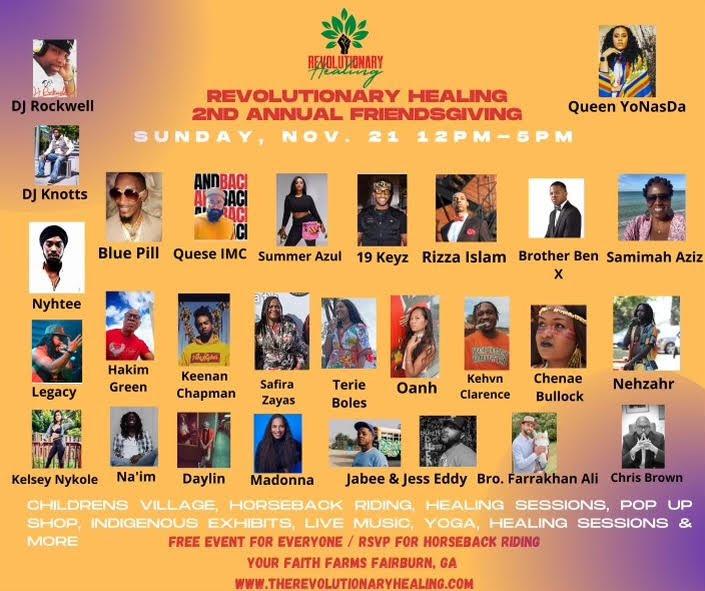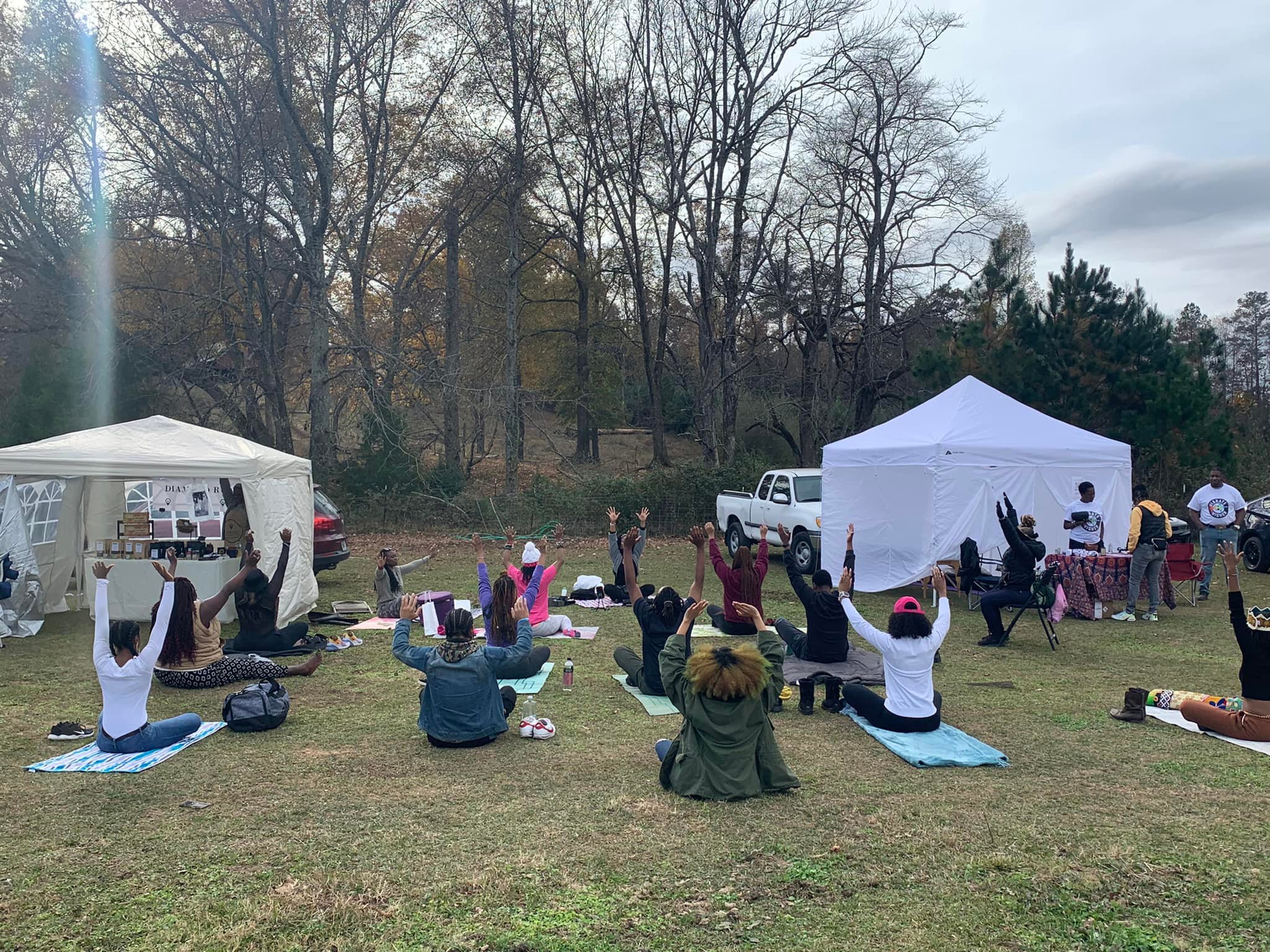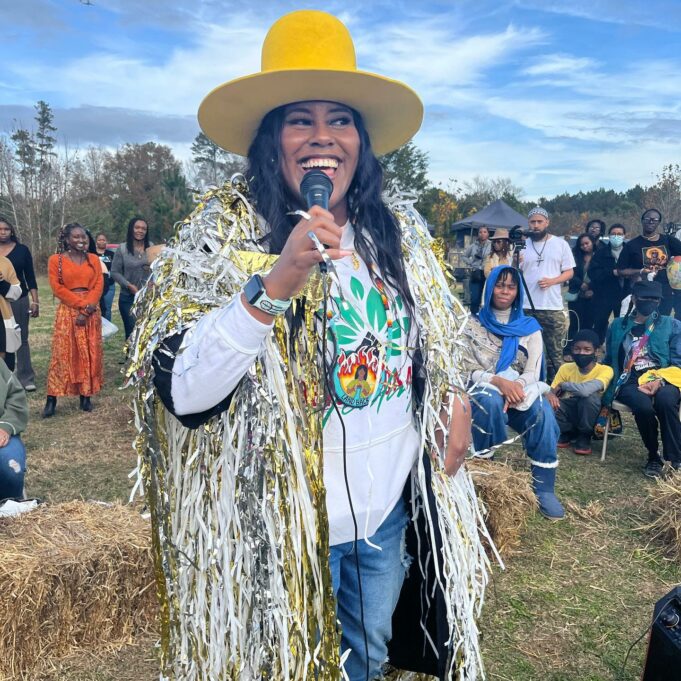The need for healing recently took full focus in Fairburn, Ga. Revolutionary Healing, founded by Oglala Lakota and Black activist YoNasDa LoneWolf, hosted its second Friendsgiving event. People from far and wide attended, participating in organic healing sessions, indigenous exhibits, horseback riding, vending, entertainment and more. From music artists to lifestyle consultants, authors, activists and nutritionists, the event attracted people who were drawn to the need for universal healing within original communities, and the call of returning to the land.
Just like the previous year, the Friendsgiving was hosted on Your Faith Farms, owned and operated by husband and wife Patrick and Ishtar Muhammad. Ms. LoneWolf describes it as a festival, and this year, the Nov. 21 gathering was co-sponsored by the city of South Fulton. This event is partially a culmination of the work Revolutionary Healing has been doing since September 2020. The focus has always been helping Black, Brown and Native communities heal from trauma and illnesses they face on a daily basis for the benefit of self and community development.
But before the idea was realized, Ms. LoneWolf had to face her own battle, which she first learned of on May 29, 2020. It was the same day she and other activists were about to march to the CNN building in Atlanta following the murder of George Floyd, a 46-year-old Black man, who was killed by a White police officer in Minneapolis.
“That morning, I also found out that I got diagnosed with cambial carcinoma––with lung cancer,” Ms. LoneWolf said. She spoke with her grandfather, Nation of Islam Minister Farrakhan, to inform him of the diagnosis.
“He was saying that he doesn’t feel an urgency in his spirit in regards to the cancer,” Ms. LoneWolf shared. He also shared with her that her diagnosis would be a 70 percent mental fight.

At that time, Ms. LoneWolf also began taking an auto-immune chemotherapy pill. The side effects made her feel sick, which caused her to shift gears when it came to her activism. She began working with Atlanta Mayor Keisha Lance Bottoms on a police accountability task force, around the time Rayshard Brooks, a 27-year-old Black man, was shot and killed by Atlanta police in the parking lot of a Wendy’s.
While doing this work, Ms. LoneWolf began to feel stuck and says she always looks to the Study Guides written by Minister Farrakhan titled “Self-Improvement: The Basis for Community Development.” Ms. LoneWolf has read the Study Guides several times, but this particular time, she couldn’t get past the cover.
“I was just like, okay, the basis of community development is self-improvement … and I was like, how can we self-improve? Like, how can I create something to help us self-improve, and in order for our community to be stronger? I kept on thinking, and I was like, oh, I’m going back to the way that I was raised,” Ms. LoneWolf said.
Ms. LoneWolf’s mother, Wauneta LoneWolf, was a motivational speaker, substance abuse counselor and healer, who hosted conferences and retreats. YoNasDa put together a team of people and kicked off Revolutionary Healing by hosting community events every third Sunday of the month.
“The basis of community development is activism, it is revolution. If we have to build a better community, that is a revolutionary act to self-improve,” she said. “We have to hold ourselves accountable for the reason why our communities are not being built the way they need to be, why there’s still violence in our community. … We constantly point the fingers [at] everyone else instead of pointing the finger at ourselves and saying let’s self-improve.”
The monthly events began as a safe space for activists to cope with the emotional weight that came with their work, but soon evolved into assisting entire communities. Most events are held in wide, outdoor spaces, including the woods, mountains and parks throughout Georgia. Participants have also done paintballing and visited museums.
Malik Bomani, co-founder of youth mentorship organization Gamebred Youth in Miami, Fla., has collaborated with Ms. LoneWolf for at least four years and is also a member of the Revolutionary Healing team. He says having these conversations surrounding mental health is a privilege.

“Most of us, especially in our communities, don’t even have the time to sit and hear ourselves think because we’re struggling with the day to day of just hustling to try to keep the lights on,” Mr. Bomani said. “Some of us have children. So, in our communities when we congregate it is often just we’re trying to deal with the realities in the best way we can.”
He says many people end up developing unhealthy coping mechanisms including substance abuse and self-medicating.
“When we’re given the opportunity, or when we’re blessed with the privilege of changing our surroundings, even if it’s just for a little bit, it changes our mind frame, and when we do that as a collective, it helps permeate the energy, like man, I feel really good and I’m around my folks and I want to bring this feeling back home.”
Ms. Lonewolf says she’s seen these events unite the people of different backgrounds who attend, as well as uniting the people back to the land. Mr. Muhammad, who owns Your Faith Farms with his wife, bought their 31 acres of land based on this principle. For years, Minister Farrakhan has instructed his followers to buy land with the goal of doing for self.
“Over time, we have seen the benefits of taking this step of faith and buying land and letting Allah (God) work through us and the land,” Mr. Muhammad said. “And so opportunities like Revolutionary Healing is where we can see, just following his instruction, what can come of hearing and obeying.”
Your Faith Farms produces fruits, vegetables, grass-fed beef and lamb. Those who attended the Friendsgiving event were able to take part in the horse-riding experience, which Mr. Muhammad says they use to assist in the healing of those who come to the farm.
“We offer the horseback experience because we know that horses are one of the most intelligent animals and we use the horses to heal the community,” he said. Teenagers, adults, couples and organizations have participated. “We use our horses as a tool to help create bonds to overcome difficulties in individuals.”
While engaging in nature, it speaks to one of the purposes of Revolutionary Healing. It also helps to limit the spread of Covid-19. Safira Zayas-Yasiin, a compliance officer and also a team member of Revolutionary Healing, helps to make sure participants follow the necessary guidelines to limit the spread of the virus.
“When we did Revolutionary Healing, that move was such a revolutionary move. It was like we took back our nature,” Ms. Zayas-Yasiin said. “We went to the earth to get our medicines. We upped all of our herbs and healing.”
She believes at one point during the pandemic, many people were afraid to leave their homes. She says being indoors and wearing masks has been a catalyst for people to seek more time outdoors.
“We went to the forest, we went to the water, to the lakes and we took a stance on our health, because we need oxygen. We need to be able to breathe, we need to tap into our deepest cells, our mother nature to get that healing,” she said. “So what I saw was fear turning into fearlessness. And from it being a handful of people coming and turning into hundreds of people coming, and still being precautious but knowing that we were in the safest space, in my opinion.”
Revolutionary Healing will not have its monthly event in December, to allow team members to recharge, Ms. LoneWolf said, but they plan to restart in January. In March, they plan to take Revolutionary Healing international. From March 8 to the 15, the goal is to take 10 people to Panama to meet with indigenous tribes and learn of Panama’s African history. Ms. LoneWolf says the need for healing is not unique to original communities within the United States.
“Internationally, all of us are in a battle with colonialism,” she said. “They colonized the entire world. So many people right now are in a battle to fight [for] their traditional way of life. We’re all in a battle.”













